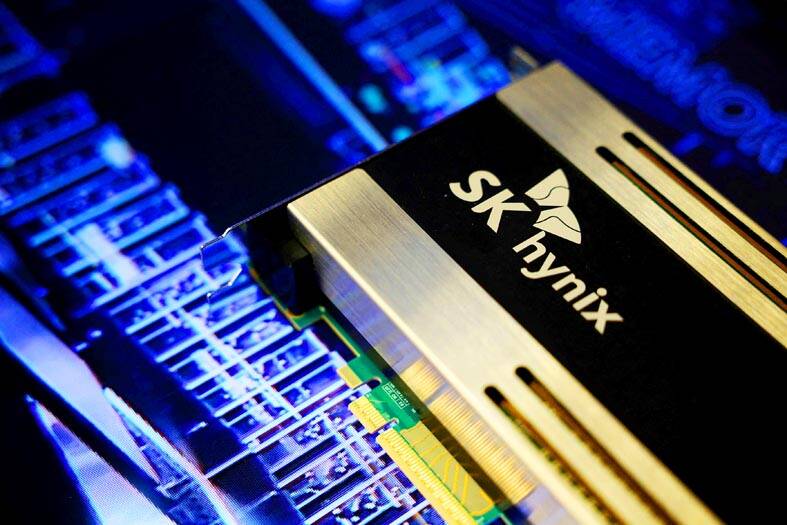South Korean chip giant SK Hynix Inc yesterday reported record quarterly profits, thanks to soaring demand for artificial intelligence (AI).
The world’s second-largest memorychip maker dominates the market for high-bandwidth memory (HBM) semiconductors and is a key supplier for Nvidia Corp.
Operating profit climbed almost 70 percent to 9.2 trillion won (US$6.7 billion) in the second quarter, with revenues coming in at 22.2 trillion won — both all-time peaks, the company said.

Photo: Reuters
It comes after Taiwan Semiconductor Manufacturing Co (台積電) last week announced a surge in net profit for the second quarter, topping forecasts, thanks to robust demand for AI technology, despite the threat of US tariffs on the critical sector.
SK Hynix added that net profit was up close to 70 percent from a year earlier at nearly 7 trillion won.
“Aggressive investment by global big tech companies into AI led to a steady increase in demand for AI memory,” the company said in a statement.
Shipments of DRAM and NAND flash topped forecasts, boosting the bottom line.
“SK Hynix foresees that increasing competition among big tech companies to enhance inference of AI models would lead to higher demand for high-performance and high-capacity memory products,” the company added.
Shares of the firms rose more than 3 percent in Seoul trading yesterday, but pared gains to close up 0.2 percent.
“Nvidia suppliers like SK Hynix will continue to enjoy strong demand in the coming months and years for memory chips due to the high memory content needed to make AI chips functional,” TechInsights Inc vice chairman and senior researcher G. Dan Hutcheson said.
Rising competition from rivals is its main risk factor, along with “saturation of the market as AI algorithms become more efficient as well as the uncertain impact of tariffs, the global trade war and the resultant potential for a global recession,” he said.
Experts attribute SK Hynix’s resilience to its growth in the DRAM market.
The firm took the lead in DRAM revenues in April, with a 36 percent market share, research firm Counterpoint said.
That surpassed South Korean rival Samsung Electronics Co for the first time — the first change in the top spot in more than four decades.
As the US has been threatening restrictions on semiconductor sales to China, customers’ pre-emptive purchases “to hedge against external risks” created a “more favorable environment” than expected, SK Hynix said in a conference call.
Despite the geopolitical situations, its production situation saw “no change,” the company added.

KEEPING UP: The acquisition of a cleanroom in Taiwan would enable Micron to increase production in a market where demand continues to outpace supply, a Micron official said Micron Technology Inc has signed a letter of intent to buy a fabrication site in Taiwan from Powerchip Semiconductor Manufacturing Corp (力積電) for US$1.8 billion to expand its production of memory chips. Micron would take control of the P5 site in Miaoli County’s Tongluo Township (銅鑼) and plans to ramp up DRAM production in phases after the transaction closes in the second quarter, the company said in a statement on Saturday. The acquisition includes an existing 12 inch fab cleanroom of 27,871m2 and would further position Micron to address growing global demand for memory solutions, the company said. Micron expects the transaction to

Vincent Wei led fellow Singaporean farmers around an empty Malaysian plot, laying out plans for a greenhouse and rows of leafy vegetables. What he pitched was not just space for crops, but a lifeline for growers struggling to make ends meet in a city-state with high prices and little vacant land. The future agriculture hub is part of a joint special economic zone launched last year by the two neighbors, expected to cost US$123 million and produce 10,000 tonnes of fresh produce annually. It is attracting Singaporean farmers with promises of cheaper land, labor and energy just over the border.

US actor Matthew McConaughey has filed recordings of his image and voice with US patent authorities to protect them from unauthorized usage by artificial intelligence (AI) platforms, a representative said earlier this week. Several video clips and audio recordings were registered by the commercial arm of the Just Keep Livin’ Foundation, a non-profit created by the Oscar-winning actor and his wife, Camila, according to the US Patent and Trademark Office database. Many artists are increasingly concerned about the uncontrolled use of their image via generative AI since the rollout of ChatGPT and other AI-powered tools. Several US states have adopted

A proposed billionaires’ tax in California has ignited a political uproar in Silicon Valley, with tech titans threatening to leave the state while California Governor Gavin Newsom of the Democratic Party maneuvers to defeat a levy that he fears would lead to an exodus of wealth. A technology mecca, California has more billionaires than any other US state — a few hundred, by some estimates. About half its personal income tax revenue, a financial backbone in the nearly US$350 billion budget, comes from the top 1 percent of earners. A large healthcare union is attempting to place a proposal before